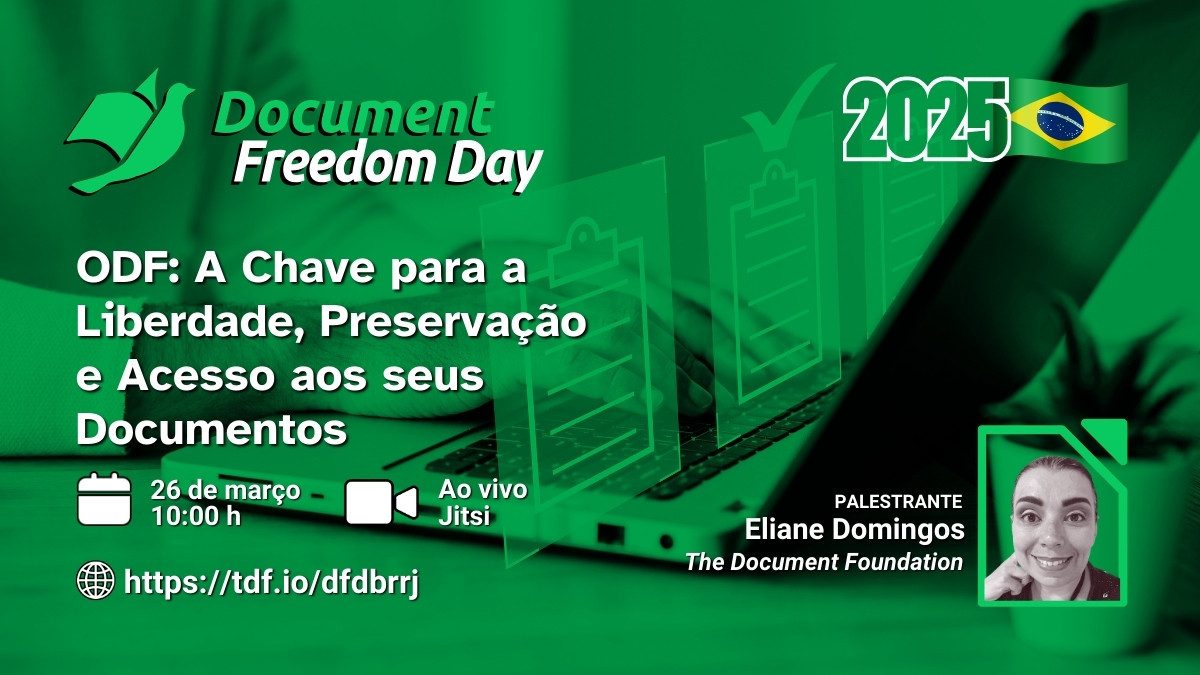Document Freedom Day is March 25th, 2026.
This year we want to make the event bigger and better than last year. You can help. Here's how.
It doesn't have to be a large event. It can be in person or virtual. Local schools, libraries and parks make great places to host an event.
Some lists of virtual hosting options are available at:
If you know of someone who can speak at a virtual event, let us know via Mastodon @ or the SFD mailing list https://lists.mailman3.com/postorius/lists/sfd-discuss.mailman3.com/
Spread the word on social media or tell your friends or clubs and organizations about Document Freedom Day. Use hashtag #DFD2026 in your social media posts about Document Freedom Day to make others more aware of the event.
The one thing that you can do that will help the most is participate!
Attend a local or virtual Document Freedom Day 2026 celebration in your area.
We'll be counting down to Document Freedom Day 2026 with posts on some cool and useful document formats and Free, Libre, Open Source document related tools on our mailing list and on Mastodon. Join us in our countdown and feel free to share your favorites too.
Brainstorm and help us come up with other ways to celebrate on our mailing list
Have you ever wanted to participate in the Free Software movement, promote privacy rights or just have better control over your own documents? Now's your chance. Join us for Document Freedom Day 2026!
How to join in:
Find out more about Document Freedom Day.
Check out some existing DFD artwork and templates and help us by adding your own or your groups resources:

Here is the SVG template to edit in Inkscape: DFD-2025-slide template
Here is what it looks like when adding the content:


As you might know, Document Freedom Day is a yearly celebration that happens on the last Wednesday of March - that means that in 2024 we were celebrating it on the 27th of March!
This year we're coordinating the celebrations with a new website and a new map, but the appeal is the same: local teams - anyone interested in celebrating this day in any way they wish to - are invited to sign up their event on this website, adding it to our map and calendar of events.
Document Freedom Day 2013 was the largest ever, with 60 events in over 30 countries, but just because less attention has been paid to this cause does not mean that it is less revelant today.
Does your public TV station stream its programs but only if you use a specific web browser? Does your public administration provide you digital services that you can only access through by using proprietary software? The need for open standards is only more relevant now, with a stronger use of digital tools to govern our daily lives. With it, more often it's the cases where you are restricted in our freedom of choice, or unable to engage in active and participative citizenship, when open standards aren't used.
As Document Freedom remains relevant, so we persist on our yearly appeal: join us in celebrating Document Freedom Day!
An ever greater part of our communication moves into the digital world. In the digital society, Open Standards and open document formats provide us with the freedom to read and write. They are crucial to ensure our ability to exchange information, remain independent of software vendors, and keep our data accessible in the long term. Open Standards also make sure that we are able to communicate and work using Free Software.
Open Standards are a common language that all computers can speak. They enable us to work and communicate using Free Software. They make it possible for developers to write Free Software applications that are compatible with other solutions, and allow users to migrate to Free Software solutions without losing access to their data.
The campaign brings a message about Open Standards and document formats to a non-technical audience. Open Standards are a basic condition for freedom and choice in software. Document Freedom Day raises awareness for Open Standards and lets everyone contribute to a better information society. It's easy and fun to participate in Document Freedom Day, whether as a group or as an individual.

Don't get locked out of your data! Open Standards are essential for freedom and privacy
Do you "own" your data? What happens if you're using a piece of software and save your work in the software's own format, and then the software stops working a few years down the line? You're in trouble. This isn't just a hypothetical situation – it happens all the time. Various stakeholders try to exploit users by offering apps or communication services that use proprietary data formats to lock users into their software, hardware and services.
But we do not have to go on like they want us to do. We can get rid of restrictions and vendor lock-ins if we keep on using Open Standards. These are data formats that can be freely implemented in any service, hardware or software.

Remember when you were sent an important file that your computer couldn't read properly? Remember having to buy or download a new application just so you could open an attachment that you needed for work? The same thing happens tens of thousands of times each day. Can you imagine how much knowledge exchange doesn’t happen just because sender and receiver (intentionally or not) are using different data formats?
Incompatibilities like this are usually caused by ways of storing information that are secret ('closed'), and privately owned ('proprietary'). They cause huge problems for people, companies, and governments, and cost society an awful lot in creativity, productivity, and efficiency. Incompatible standards are used to manipulate markets and allow companies to charge people huge fees simply for the privilege of accessing their own data.
That's why Open Standards are so important. Only openly implementable, usable and documented standards can guarantee their compatibility throughout any software on any devices today and in the future. Data formats and standards should be open during transmission as well as storage, including interfaces and protocols.
Document Freedom addresses much more than just essays and spreadsheets. It's about control of any kind of digital data - including artwork, sheet and recorded music, emails, and statistics. These can be stored in ways which empower users, but they can also be stored in formats which constrain and manipulate us at enormous cost. Documents that aren't free are locked to some particular software or company. The author cannot choose how to use them because they are controlled by technical restrictions. Just like a powerful car that is artificially restricted to 30 km/h.

Open Standards, instead, are formats and protocols which everybody can use free of charge and restriction. They come with compatibility "built-in" - the way they work is shared publicly, and any organization can use them in their products and services without asking for permission. Open Standards are the foundation of cooperation and modern society: train tracks, power sockets, and natural language are all examples of specifications that we all rely on and take for granted.
Imagine if speaking English required permission and a license fee - society would be backward and chaotic. Hence, documents that are free can be used in any way that the author intends and without restrictions. They can be read, transmitted, edited, and transformed using a variety of tools.
Document Freedom Day is an yearly celebration that happens on the last Wednesday of March.